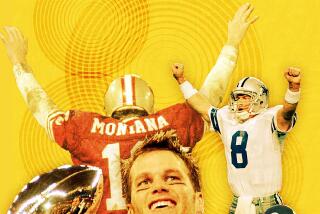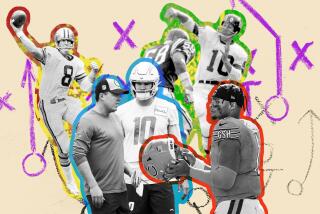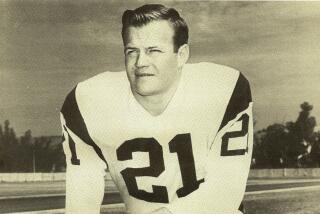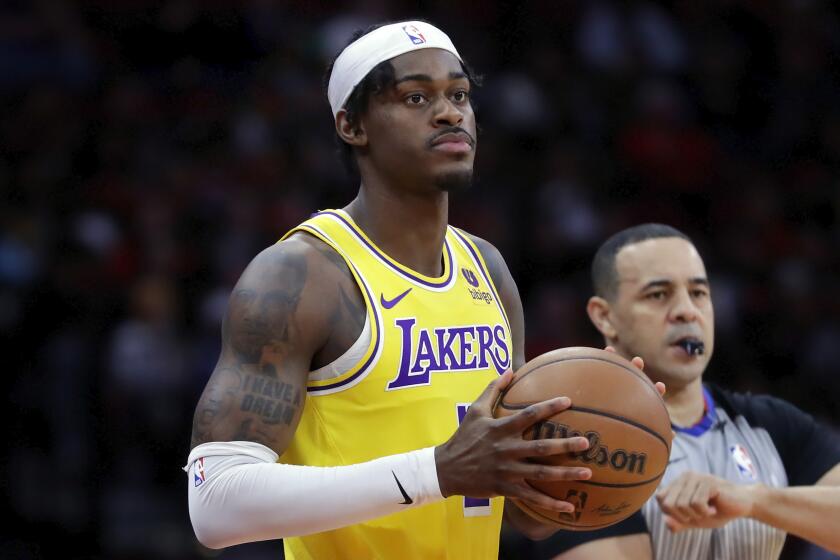Willie Thrower, 71; First Black Quarterback in NFL
- Share via
Willie Thrower, who broke pro football’s color barrier as the NFL’s first black quarterback, has died. He was 71.
Thrower died Wednesday of a heart attack at his home in New Kensington, Pa.
His NFL career was as brief as it was meaningful. He played one season for the Chicago Bears and saw action in only one game, against San Francisco on Oct. 8, 1953. He relieved George Blanda, completing three of eight passes for 27 yards with an interception in a 35-28 loss.
“It absolutely wasn’t a story at the time,” said Ed Sprinkle, a receiver and defensive end for the Bears from 1944 through 1955. “Nobody even thought about it. He was just one of the guys.”
The NFL had 12 teams and only 15 black players in 1953. Thrower was the only black player on the Bear roster.
He was also the first black quarterback to play in the Big Ten, helping Michigan State to a national title in 1952.
He went undrafted, though, and signed with Chicago for $8,500.
“The coaches didn’t think a black quarterback had the knowledge or the know-how to run a team,” Thrower told the Associated Press last year. “They felt a black quarterback didn’t have the leadership.”
The Bears invited Thrower back for the 1954 season, but they had just given rookie quarterback Zeke Bratkowski a $75,000 signing bonus--astronomical in those days--and that led Thrower to try his luck in the Canadian Football League. He spent three seasons with the Winnipeg Blue Bombers and played some semi-pro ball in Toronto before a separated shoulder ended his career at 27.
After retiring from football, Thrower became a social worker in New York and New Kensington. He eventually owned two taverns.
Thrower’s accomplishment is memorialized in an exhibit at the Pro Football Hall of Fame, and he figured prominently in an ABC television special about black quarterbacks. Until that point, he was essentially anonymous--even in his hometown.
“A lot of people called me a liar,” he said after the special aired. “Now ... they say, ‘Gee whiz! Here’s a guy living in our hometown. We didn’t know he was the first black quarterback. Just like they didn’t know, the rest of the country didn’t know.”
One of Thrower’s favorite NFL memories didn’t occur on the field, but in a train compartment on a trip from Baltimore to Chicago when he received some kind words from Blanda.
“He said, ‘You know what, Will? If I could throw a football as good as you, I’d be playing for the next 35 years,’” Thrower told the Chicago Tribune. Interestingly, the weaker-armed Blanda played 26 years in pro football and wound up in the Hall of Fame.
Former Denver Bronco Marlin Briscoe, who in 1968 became the first black quarterback to earn a starting NFL job, has long viewed Thrower as an inspiration.
“When I was growing up, I would only see the Johnny Unitases, the Bart Starrs, the Y.A. Tittles on TV,” Briscoe said. “All of them were white.... It wasn’t until later that I found out what Willie Thrower had done, that he had actually played in a game. It gave me hope.”
In the just-completed season, there were 23 black quarterbacks on NFL rosters, seven of whom were starters. Thrower said he understood the significance of his appearance in that 1953 game when it happened, even if some of his teammates didn’t.
“I was aware,” he told the Chicago Tribune in 1988. “I knew there had never been a black quarterback. I was proud of it, and I still am today. It was a Jackie Robinson-type thing. It was pioneering. It was a step forward.”
More to Read
Go beyond the scoreboard
Get the latest on L.A.'s teams in the daily Sports Report newsletter.
You may occasionally receive promotional content from the Los Angeles Times.











